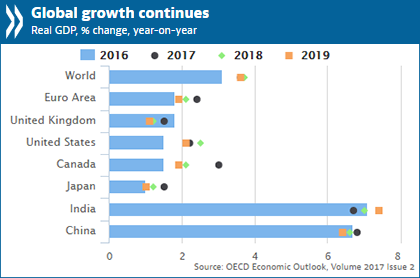
The Organisation for Economic Cooperation and Development (OECD) has warned the UK should prepare for a sharp slowdown in growth due to leaving the European Union.
As part of its latest economic outlook, the Paris-based international organisation said UK growth is set to fall further over the next two years to 1.2 percent and 1.1 percent, after easing to 1.5 percent for 2017.
It could ultimately hit the UK’s jobless rate which currently sits at a record low of 4.3 percent.
The OECD said:
Economic activity is set to grow at just above one percent in 2018-19, with the negative impact of uncertainty about the final outcome of Brexit negotiations being partly countered by an assumed agreement on a transition period after March 2019. However, this pace of growth will not be sufficient to prevent a moderate rise in the unemployment rate.
It added that “job creation is losing momentum”.
How well do you really know your competitors?
Access the most comprehensive Company Profiles on the market, powered by GlobalData. Save hours of research. Gain competitive edge.

Thank you!
Your download email will arrive shortly
Not ready to buy yet? Download a free sample
We are confident about the unique quality of our Company Profiles. However, we want you to make the most beneficial decision for your business, so we offer a free sample that you can download by submitting the below form
By GlobalDataThe think tank does however expect that a transition period would be secured between the UK and EU after 2019.
As well as Brexit the group warned that productivity, inflation due to the cheaper pound, and ballooning consumer debt are also going to weigh on consumption.
The think tank said:
Private consumption is projected to remain subdued as higher inflation, pushed up by the past depreciation of sterling, holds back household purchasing power.
The OECD’s GDP growth forecasts undershoot those issued by the UK’s Office for Budget Responsibility, which currently expects GDP growth of 1.4 percent in 2018 and 1.3 percent in 2019.
Recent Office for National Statistics (ONS) figures meanwhile show the number of people classed as economically inactive increased by 117,000 to 8.8m, the biggest rise in more than seven years.

Business investment remains too low
The think tank also warned that business investment rates in most large economies remain too low to keep the global economy powering forward.
The OECD found the current momentum and high global growth rates would continue next year but fade in 2019 unless investment improved.
Catherine Mann, chief economist of the OECD, said:
Policy is currently stimulative, but in the absence of structural reforms, we won’t get the private sector investment to get the productivity improvements we need.
What’s the outlook for the rest of the world?
Meanwhile, the global economy is looking up.
It has strengthened as monetary and fiscal stimulus underpin improvement in growth rates across most countries.
The Paris-based think tank forecast global economy to grow 3.6 percent this year, instead of 3.5 percent projected in September. The outlook for 2018 was retained at 3.7 percent.
OECD secretary-general Angel Gurria said:
Growth has picked up momentum and the short-term outlook is positive, but there are still clear weaknesses and vulnerabilities. There is a need to focus structural and fiscal action on boosting long-term potential as monetary policy support is reduced. Countries should implement reform packages that catalyse the private sector to promote productivity, higher wages and more inclusive growth.
The global GDP is forecast to expand 3.6 percent in 2019.
In the US, growth was estimated at 2.2 percent in 2017, rising to 2.5 percent in 2018, then dropping back to 2.1 percent in 2019.
The euro area was expected to grow at a 2.4 percent rate in 2017 and a 2.1 percent pace in 2018, before slowing to a 1.9 percent pace in 2019, the OECD said.






